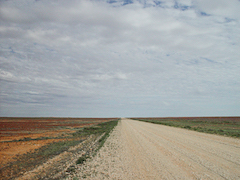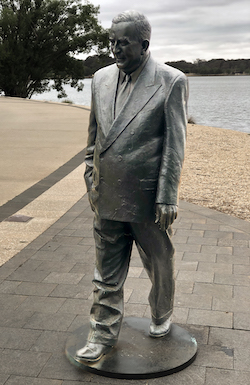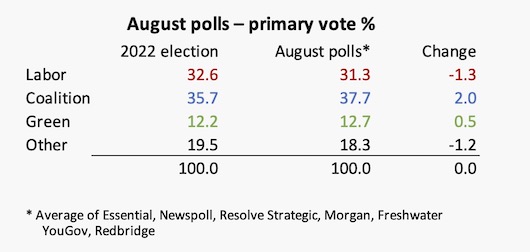Politics
LGBTQI+ and the census – backdowns and backdowns from backdowns
Did our politicians learn nothing from the 2017 plebiscite, when 62 percent of the electorate voted “Yes” to same-sex marriage? It was a clear demonstration that gender and sex diversity were not just fringe or “woke” issues. To the surprise of all concerned, the “Yes” vote was highest in some of the Coalition’s strongest electorates, such as in outback Queensland. Adrian Beaumont’s Conversation article of the time mapped the electoral geography of that vote.
Dutton showed that he hadn’t learned that lesson when he said:
If you’ve got the woke agenda, which I think is at odds with the vast majority of Australians, then the prime minister should argue that case, but I think we’re pretty happy with the settings that we’ve got in place. [emphasis added]
Gripped by a fear that Dutton was planning to portray the government as more concerned with fringe left-wing issues than with the state of the economy, Albanese backed down on a promise he had made to include a question on people’s sexuality in the census.
Amy Remeikis, writing in The Guardian, provides a reasonably clear explanation of why the government backed down. The government wanted to head off a culture war:
Concerns were raised over what conservative culture warriors would have done with the questions and particularly the potential impact on trans children particularly. Labor figures said there was also anxiety the Greens may have seen an opportunity to push the government “to go further”.
It soon became clear that Albanese too hadn’t learned much from the 2017 plebiscite, as the ABC’s Jake Evans pointed out: Albanese's government losing friends fast as it tries to avoid division by starting fight.
Then the backbenchers, more in touch with the Australian people than either Dutton or Albanese, weighed in. ABC’s Krishani Dhanji and Tom Crowley wrote about the disquiet: Labor faces fresh internal backlash over gender and sexuality in census. At least six Labor Members of Parliament, including Assistant Minister Ged Kearney, publicly disagreed with the government’s backdown. So too did Independent Allegra Spender.
What probably pushed the issue for Dutton was the response from Liberal backbenchers. Bridget Archer, for example, said:
I just don't really agree that there's some sort of “woke agenda” with asking questions around population data for our country. The information is not really woke or otherwise, it's just information. I think this was a non-issue until the government made it an issue.
That view was publicly backed by at least two other Liberal members of Parliament.
Within a day of making his “woke” statement Dutton backed down, with his “fine with that” statement. That cleared the way for Albanese to back down from his backdown, which Michelle Grattan describes in The Conversation: Albanese backs down over sexual orientation census question. (Grattan correctly reports it as a government backdown, but doesn’t point out that the initial backdown was Dutton’s. (Is there some reason she is reluctant to call out the Coalition’s behaviour, and what is wrong with a politician changing his or her policies in response to reasoned criticism?)
Whatever the reason for his backdown, Albanese could have simply acknowledged that the two-party political score was one-all, and promised to hand the issue over to the ABS, with the suggestion that they consult with those who seek to have questions of gender and sexuality in the 2026 census.
But instead his immediate response, before backing down, was to say the draft questions he had seen were “inappropriate”, and he told the ABS to stop the process, as if he was taking an extreme line to confirm Labor’s anti-woke credentials.
He has since done what he should have done at first, and has essentially handed the issue back to the ABS.
In fact the ABS has been concerned with sex and gender diversity for many years, and was consulting with the LGBTQI+ community in the lead-up to the 2021 census. It has been a technically tough process.
As for the actual questions in the census, that is nowhere near being resolved. Xavier Mills and Sal Clark of Swinburne University of Technology are in favour of the census including questions about gender and sexual identity, but they’re aware of the practical issues involved (in a way that politicians and advocates aren’t): LGBTQI+ Australians are tired of being ignored. Here’s why counting them in the census is so important.
Are people to be asked to reveal their biological sex, their gender identity, their sexual preferences, or all three? Mills and Clark point out the difficulty the ABS had in the 2021 census, which allowed people to choose “non-binary sex”, but it wasn’t clear to respondents whether that referred to their biological sex (male, female, intersex), their gender identity, or their sexual preferences. The ABS found they couldn’t infer anything much from the responses, and resolved the issue with what Mills and Clark call “straightwashing”.
The very term LGBTIQ+ is confusing, and every time a consonant is added the confusion expands in a factorial function. There are overlaps and category confusions: for example if the term “Gay” means “homosexual, why is there a separate category “Lesbian” to cover female homosexuals? What does the “+” sign mean?
Designing a question, or a set of questions to satisfy the demands of the LBBTQI+ community is a statistician’s nightmare. You can see how the ABS has grappled with these complexities in its 2021 directive: Standard for Sex, Gender, Variations of Sex Characteristics and Sexual Orientation Variables. (Horrible reading.)
In presenting this issue in the single frame as a demand for respect or recognition, the LGBTIQ+ community has not done itself any favours. Even if they had to be dragged along by their backbenchers, Labor and Coalition politicians recognize the importance of the issue, and the Greens needed no convincing.
But LGBTIQ+ spokespeople should acknowledge that obtaining meaningful information has technical and definitional problems, explain why they want questions in the census rather than in a special survey specifically targeted to their needs, and how the answers might help in the design of public policy.
But the community still seems to be arguing on a broad basis, as if the issue is to gain recognition. This is illustrated in a Radio National interview on Monday morning with Nicky Bath of LGBTIQ+ Health: LGBTIQ+ group wants more questions in census. Getting down to practicalities is hard work, and it requires some understanding of statistics and survey techniques. Unless the task can be done professionally, there will be a repeat of the 2021 process in which we learned nothing, or the ABS may convince the government that it’s just too hard.
Dutton and Albanese should both feel chastened by the experience. Albanese has shown that he can respond to the concerns of backbenchers and others in touch with the community, but has done so in such a hesitant and gauche way that he has come across as indecisive and timid – easy prey for an opposition that sees politics in terms of destroying the prime minister’s credibility.
The government’s bipartisan obsession
The 2022 election and subsequent opinion polls show that around one third of voters support Labor, one third the Coalition, and the other third someone else.
Yet almost from the start of its term in office, the Albanese government has been seeking “bipartisanship” on important legislation. This happened at first with laws to establish a national integrity commission: in a deal with the Coalition the government agreed that the commission would generally not have public hearings.
More recently the government has been engaged in negotiations with the Coalition to water down the proposed Aged Care Act, so as to remove provisions that impose a statutory duty of care on aged-care providers, which could result in criminal convictions for offenders. See Sarah Holland-Batt’s Saturday Paperarticle: Criminal penalties proposed for aged care bosses.
Legislation is now before the Senate to establish a strong environmental protection agency, with primary responsibility for deciding whether developments should proceed.
But Albanese says he’s open to doing a deal with the Coalition to remove those powers, in order to get the legislation through Parliament. The government seems to be determined to go down this path, rather than to negotiate with Greens and independents, who seek to see Labor establish a strong environment protection agency, as Labor had promised.
In a short (8 minute) interview on Radio National Senator David Pocock explains that it is quite possible to get legislation for a strong EPA through the Senate, without Coalition support, but he fears the government has “no guts”: Anthony Albanese offers to water down planned environmental watchdog to secure Coalition support.
Pocock is concerned not only that the EPA may not have the power to accept or reject proposals, but also that it could have two specific carve-outs. One of those carve-outs would exempt regional forest agreements from the authority’s scope, and the other would restrict the authority from considering a project’s contribution to climate change.
It’s hard to understand this obsession with “bipartisanship”. The explanation that comes to mind is that the government wants to provide certainty to the electorate. Businesspeople understandably like to be able to plan projects in the knowledge that legislation isn’t going to change as soon as there is a change in government.
But who is to say there is something permanent about the present Coalition front bench or their policies? Unless there is some extraordinary reversal of long-term political trends, the probability that in the near future we will have a Coalition government with a compliant majority in both Houses of Parliament is next to zero, and there is a strong possibility that the present hard-right orientation of the Liberal Party is just a passing phenomenon: it might reform or disappear, making way for a replacement centre-right party.
Politically the Albanese government is coming across as weak and subservient to the Coalition, as if it is an interim government in office, only until the Coalition cleanses itself of the stench of the Morrison administration. At the same time it is showing disrespect to independents in the House of Representatives upon whose support it will probably be dependent after the next election.
Dutton’s electoral road to nowhere

Peter Brent exposes Dutton’s political tactics in an Inside Story contribution – Peter Dutton’s road to nowhere – suggesting that his obsession with immigration, an election asset to right-wing populists in the USA and in many European countries, is electorally ineffective in Australia.
He traces Dutton’s use of dog-whistle politics on immigration and race. He is clearly aware of Goebbels’ political advice – “repeat a lie often enough and it becomes the truth”. But he sees a political downside in that tactic:
Of course, race-based messages have a visceral appeal for some people, and a subtle effect on many more. But like that other supposed Coalition trump card, opposition to action on climate change, it’s a two-edged sword. At some level voters know they’re being played. And they know it’s not dignified behaviour.
Germany’s Länder elections – a warning for social democrats

Pulling in different directions
There were elections in two of Germany’s 16 states (Länder) last Sunday, in which the far-right Alternative für Deutschland (AfD) emerged with around a third of the vote – 33 percent in Thüringen and 31 percent in Sachsen.
These two small states are in the south of the old East Germany. With a per-capita GDP of €36 000, Thüringen is the poorest of all 16 states: neighbouring Bayern, in the old West Germany, has a per-capita GDP of €57 000. Sachsen is only a little more prosperous. (Australians are often surprised by the extent of economic disparities within European countries.)
The ABC’s Heloise Vyas and Nelli Saarinen provide a short summary of the elections: A far-right party has won a state election in Germany for the first time since Nazi rule. Here's what it means. They describe the rise of AfD and its policies (the usual far-right bundle including opposition to immigration and action on climate change, with a dose of racism thrown in).
Although AfD won the greatest share of the votes in Thüringen, and came in just behind the Christian Democrats (Christlich Demokratische Union), in Sachsen, they cannot muster enough support from other parties to form government. The general assumption is that the Christian Democrats will form some alliance in order to form government in both states.
There is a reasonably comprehensive summary of the outcomes of the elections on Deutsche Welle: German elections: far right wins big — results in numbers.
In both states while the leading parties are the AfD and the Christian Democrats, in third place with respectable support is a relatively new party, the Sahra Wagenknecht Alliance (Bündis Sahra Wagenknecht). Writing in Euronews, Alessio Dell’Anna refers to Sahra Wagenknecht as the woman cannibalising the country’s left. She had an impeccable Marxist upbringing in East Germany, and until earlier this year was a member of the Die Linke Party, the remnant of the old East German Communist Party. Dell’Anna summarizes Wagenknecht’s politics:
Wagenknecht's split from the leading leftist party in Germany was rooted in her belief that left-wing parties no longer serve the working class, have loosened up too much on migration and have given in excessively to environmental policies — matters she vehemently opposes.
Wagenknecht takes a hard line against supporting Ukraine, and is in favour of a much stronger relationship between Germany and Russia.
The other notable outcome from the election has been the poor showing of the Social Democrats (Sozialdemokratische Partei), the party of Chancellor Olaf Scholz, and of die Linke (their vote presumably having gone to Wagenknecht), and the Greens (die Grünen).
One interpretation of the outcome is that not too much notice should be taken of political developments in two states on Germany’s periphery, with only 6 million of that country’s 84 million, and with a collapsed industrial base: Thüringen, for example, once had a car plant, the Automobilwerk Eisenach, making the Wartburg, an upmarket variant of the Trabant.
That would be the wrong lesson, because it’s clear from these results that those who are poorest and who feel most left behind and disrespected have turned away from traditional parties of the left, towards hard-line populists.
Public opinion: The Redbridge Survey
The ABC’s Patricia Karvelas has brought to our attention some of the findings of the August Redbridge surveyof public opinion. (Don’t be distracted by the headline – her article’s main content is about the Redbridge findings.)
She draws attention to the finding that only 24 percent of respondents answer “yes” to the statement “Can you name something the federal government led by Anthony Albanese has done since being elected to make your life better in any way?”. Of those who did answer “yes”, the only things that got a significant response were the tax cuts and the electricity rebates.
That low appreciation aligns with her assessment that Dutton has deliberately been putting issues on the political agenda – Gaza refugees, census questions – to take away attention from the government’s achievements. That’s probably so, but Karvelas and other journalists should remember that these matters distract voters because journalists choose to emphasise them. They don’t manage to dominate the airwaves through their own power.
It’s revealing to go past Karvelas’s summary and to dig into the poll itself. It’s extensive, and any summary inevitability misses important findings, but there are some that do stand out.

The overwhelming impression one gets is that the government is aiming to do the best it can for a comfortable middle class. Young people feel particularly overlooked by the government, while people enjoying high incomes generally feel positive towards the government. It’s as if Menzies has risen from the grave, and is pursuing his policies for middle Australia.
The survey dismisses the idea that everyone, or almost everyone, believes that the Coalition are better economic managers than Labor. When asked who they think are better, the two main parties tie at 31 percent. People with high incomes, people with university degrees (a clear overlap), and people who live in inner suburbs, are most likely to credit Labor with economic competence. The only groups who have strong faith in the Coalition’s economic competence are people over 65 and those who own their homes outright (another overlap).
Neither Dutton nor Albanese come up well on a set of questions on “leader ratings”: their scores are low and almost identical.
Unlike other polls, Redbridge uses religion as one of its categories, with four classifications: Protestant, Catholic, Other religions, and No religion. On the questions where they use these classifications there are quite strong differences among respondents. As a rough generalization, those who reveal “no religion” are more favourably disposed to Labor than they are to the Coalition.
There is a question on people’s attitudes to granting visas to Palestinians fleeing Gaza. As reported in the media, 34 percent of respondents oppose giving visas while only 22 percent support giving visas. People born in another country reflect that same opposition: immigrants are often the first to call for the gatekeepers to lift the drawbridge.
Not reported in the media is the way religious affiliation relates to people’s attitudes to visas for Palestinians. Net support (support minus oppose) is lowest among Protestants (minus 39 percent), followed by Catholics (minus 26 percent), other religions (minus 9 percent). Only those professing No religion express net support for visas for Palestinians (plus 13 percent). Perhaps the New Testament story of the Good Samaritan has been excised from recent editions of the Bible. (Samaria is in the centre of present-day Israel, including a large part of the West Bank.)
Other polls
The results of the most recent polls covered by William Bowe’s Poll Bludger, taken over August, are shown below.

In comparison with the July polls these suggest that Labor’s position in comparison with the Coalition may have improved a little, but one should never read much into month-to-month movements.
One finding that seems to go against the way the media are interpreting the political landscape relates to inflation. Reporting on the supplementary findings in the most recent Newspoll, Bowe states:
The poll also finds “only a quarter” consider inflation would be lower under the Coalition, with 18% believing it would be higher and 41% opting for neither.
(NB Bowe is seeking donations.)
National polls have an unavoidable bias in that they understate support for strong local candidates, particularly independents. That 1.2 percent loss in support for “Other” is probably quite wrong. The ABC’s Brett Worthington looks at the possible electoral outcomes involving independents holding on to all or most of their seats: The latest Coalition scare campaign about Labor may scare itself more than voters. Dutton hopes that voters don’t want a minority government, but that may be a serious misreading of public opinion.